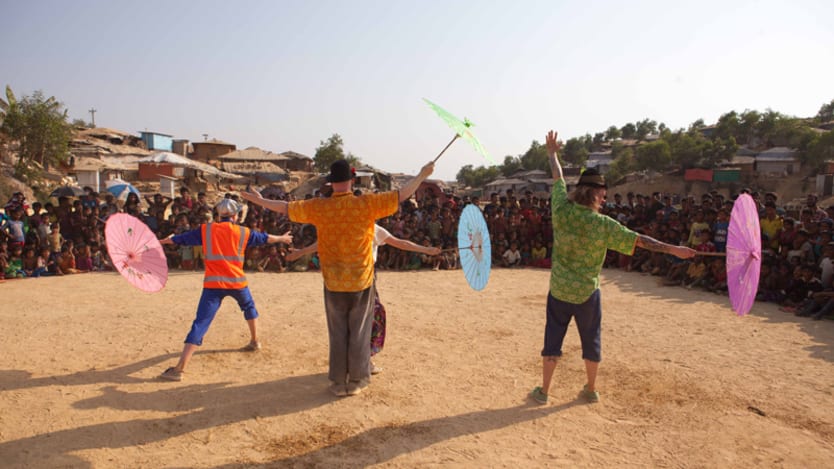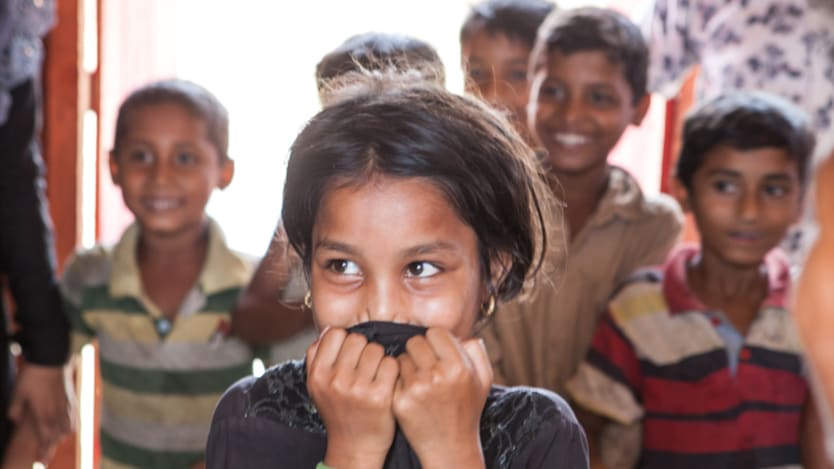
COX’S BAZAR, Bangladesh — On a hot December afternoon, four clowns wait patiently for children to settle down. The teachers are struggling to bring order amongst the 500-odd children, who are transfixed. Some have their mouths open and others sit down without taking their eyes off the clowns — sometimes plopping onto a friend’s lap, adding to the commotion.
The children live in Kutupalong-Balukhali camp, the world’s largest refugee settlement, that stretches south from Cox’s Bazar, Bangladesh. None of them have seen a clown in real life — until now.
“What we bring cannot be measured, but it is undeniable that laughter prolongs lives. It is, after all, the best medicine.”
— Nicholas Mamba, clown, Clowns Without BordersThe show itself is over the top, with exaggerated sloppiness, magic tricks, and juggling routines. There are many pratfalls — the technical term for a staged tumble — for comic effect. The clowns play for awkwardness intentionally, and it gets a laugh every time. The show is held in a “child-friendly space,” a version of playschools with open areas, but set inside a refugee camp. The clowns wear goofy clothes, but no makeup. Just a big red nose.
In Myanmar, where many of these children were born, the Rohingya Muslim community was subjected to state-backed violence, which the United Nations has declared a “textbook example of ethnic cleansing.” More than 740,000 Rohingya have fled across the border to Bangladesh since August 2017. The total number of Rohingya refugees now stands at 909,840. Nearly 498,700 — or 55 percent — are children, now living in a refugee camp the size of a small city, with few schools or playgrounds, and often saddled with responsibilities of household chores such as collecting firewood or working as day laborers.
Not today though. Today, they are here to watch clowns.
A global network of clowns
Two of the four clowns, Jonas Sjögren and Nicholas Mamba, are visiting the camp for the second time. It’s been almost 11 months since their first visit, and they are pleasantly surprised that the children remember them.
“Every person in the camp is worth coming back to,” said Mamba, a clown from Swaziland, on his second expedition to the Rohingya camps. Rohingya refugees are used to celebrities visiting the camps, but it is the clowns who truly enjoy unparalleled celebrity status.
“We got out of the car, and hundreds of kids were screaming and running towards us. They recognized us instantly. We were not even wearing the red noses,” Sjögren said. Within minutes, a ripple went through the camps: “Each kid’s excited scream attracted 10 more. Before we knew, hundreds of kids were running at us,” he recalled.
Excited screams from children, thunderous applause, and roaring laughter are all rare commodities in a refugee camp. It makes these workshops and performances precious.
The teachers eventually impose order, and the show begins.
The jokes are elementary. In one case, the routine simply involves a farting noise and the audience is helpless with laughter. “We were singing a song and we made a farting noise. One girl, in particular, could not stop laughing. I sincerely believe, in that moment — reduced to a little pile of laughter —she isn’t aware she is in the middle of a humanitarian crisis,” Sjögren said.
For the last 20 years, Clowns Without Borders, a global network of clowns, has been working in places that are in dire need of laughter: “Doctors Without Borders helps people survive. We teach them to live on. We don’t come with candy or medicines. What we bring cannot be measured, but it is undeniable that laughter prolongs lives. It is, after all, the best medicine,” Mamba added.
The organization was founded by a legend among clowns: Tortell Poltrona, who was invited to perform in a refugee camp in Croatia, created as a result of the Yugoslav Wars in the ‘90s. The Spanish clown’s performance unexpectedly attracted audiences of more than 700 children, making Poltrona realize that there was a great need for clowns in crisis situations. Poltrona grew up in Spain under the Franco dictatorship, and he considered clowning to be a creative way to help children suffering from post-traumatic stress disorder express themselves without having to rely on words.
Since then, CWB has worked with the UN Refugee Agency to offer humor and art as a means of psychological support to communities that have suffered trauma.
Filling a void
Opinion: Refugee children need more than water, food, and shelter
Lego Foundation CEO John Goodwin explores how providing for refugee children must go beyond basic survival needs. Children's lifelong development and learning are determined by a key ingredient: play.
In the Rohingya community, clowning has emerged as a creative resource to help children who are dealing with trauma. In the camps, the impact of their experiences manifests itself amongst children in unexpected ways every day. Sjögren gave an example of a child who flinched when the clown raised his hand to wave at him.
Traumatic stress can be associated with lasting changes in the brain, particularly for children. During the targeted violence in 2017, some of the Rohingya children saw their family members being tortured, raped, and murdered.
One in 2 Rohingya children who fled to Bangladesh were orphaned by violence, while more than 6,000 children living in Cox’s Bazar are alone or have to fend for themselves, according to a study by Save The Children. Education and psychosocial support for the children — now being referred to as a “lost generation” by UNICEF — has emerged as a priority area for aid agencies.
“We are talking about children who climbed a mountain, barefoot and hungry to get here. They are strong and resilient. They are motivated to learn new things,” said Charbel El Hajj, who works with Terre Des Hommes, a Swiss children’s aid organization working on child protection and psychosocial support.
Unable to verbalize their feelings, traumatized children may experience chronic stress, vigilance, fear, and irritation, according to El Hajj.
A performance by the clowns will not remedy any of that — not today anyway. But it will briefly allow the children to experience something different. “Laughter opens something very fundamental in people. If we open that door in a safe place, it creates resilience and empowers the healing process,” Mamba said.

Learning by laughing
Performances are not entirely without lessons, though. Aid organizations such as TDH, which collaborates with clowns and brings them to the camps, weave messages about sanitation and personal hygiene; trust-building exercises; and motor skill development into the performance.
Avenues for formal education are rare in the Rohingya refugee camps. Rohingya families and Bangladeshi officials have criticized the U.N.-backed humanitarian operation — which has received $655 million in international aid over the last year — for providing inadequate classrooms and curriculum. The curriculum to be taught during 2019-2020 is still being finalized.
“The competency-based learning framework and approach is gradually being introduced in the camps,” said Frederic Vincent, who heads education sector activities inside the camps for UNICEF. New learning materials are being piloted and a planned rollout for all children is likely to be completed by March 2019, he said.
In absence of formal education, nonformal education imparted during CWB performances fills a critical void that helps children cope with the realities of life as a refugee. The clowns conduct workshops for children on behalf of aid organizations, whose employees are trained to continue the lessons after they leave. The messages are simple: Work in a team, learn to trust each other, trust this space.
“If they build a human pyramid and it starts to shake, we teach them how to slow down, disentangle, and do it without hurting each other. The children fall a lot but they learn along the way, form closer friendships,” Sjögren explained.
Midway through the show, the clowns realize that adults have lined up on elevated roads around the play area, so they start playing to the older audience as well.
“The parents are happy because their children go back home smiling. It is a rare thing in the camps,” said Tania Nachrin, psychosocial support coordinator at TDH. A day after the clowns leave, every returning child has the same question: When will they be back?
The day the clowns performed fueled conversation for months after the show. It was one of the few days when Rohingya children were not refugee children, queuing up to collect food coupons, medicine, or shelter supplies. They were just children, for a brief second, in the middle of a humanitarian crisis.
Search for articles
Most Read
- 1
- 2
- 3
- 4
- 5








